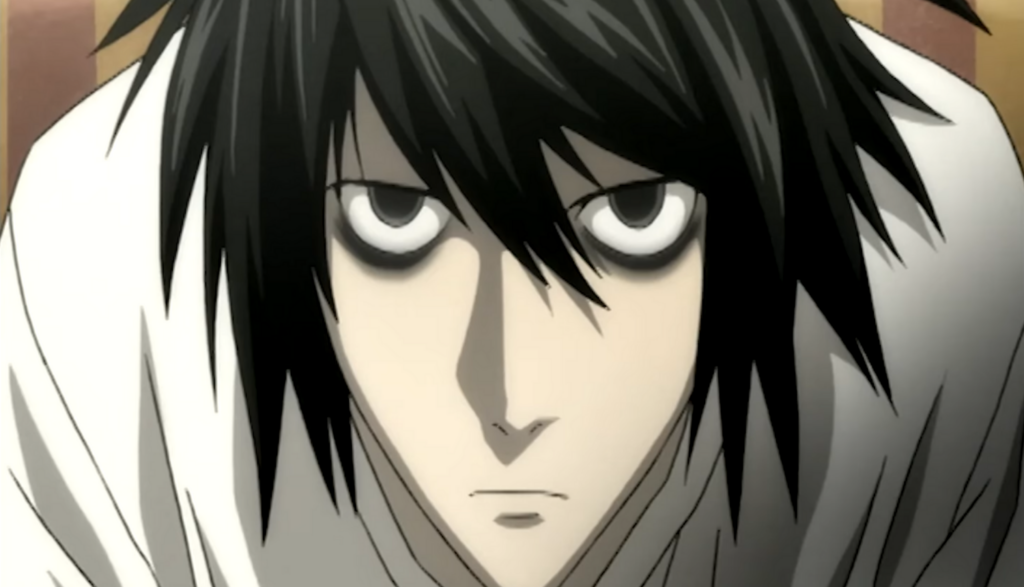
The Bear
FX’s The Bear shows a restaurant business behind closed doors–filled with high-level dysfunction and piles of profanity.

“Look around. There are plenty of things this world could do without,” Light Yagami says. “Immorality. Sin. Crime. It’s time for a change.”
And Light is the one who will bring it about.
To Light, this world is rotten. It’s filled with people who do wicked deeds and deserve to be punished. And up until recently, Light could only watch as it descended into moral darkness.
That was, of course, until he found the Death Note.
A shinigami—a god of death—dropped the deceptively innocent-looking notebook in the human realm, and Light got to it before anyone else did. And with it, Light holds, literally, the power of death in his hand.
All he needs to do is to write down a person’s name in the notebook while picturing their face in his mind. And lo and behold, within 40 seconds of writing, that person will die of a heart attack. Light realizes that he can finally bring justice to the world by killing criminals. He figures that people will eventually begin to catch on that there’s someone out there responsible for the sudden uptick in heart attacks—and they’ll fall, morally, in line, so as to not be slain as well.
“It’s only a matter of time before people figure out that these criminals are being eliminated by someone,” Light says. “I want the world to know of my existence—that there’s someone out there passing righteous judgment on the wicked!”
Well, he’s right on that end. Following the deaths of hundreds of the world’s more infamous criminals in a five-day span, people do begin to notice the trend, including the United Nations, who have unilaterally decided to request the help of the elusive “L.” L is a world-renown detective and genius who has never failed to get to the bottom of a case, and something like this is right up his alley.
Unfortunately for Light, L has never revealed himself—even his real name—to the public, so it’s impossible for Light to kill him using the Death Note. But unfortunately for L, Light is, like him, a genius. In fact, he’s the top student in all of Japan—so catching him won’t be as easy as L hopes.
And let the game begin.
The Bible says that vengeance is the Lord’s to repay.
But with his hands on the Death Note, Light considers himself to be on par with God.
Death Note, originally released in 2007, consistently ranks as one of the top anime TV series of all time—and it’s not hard to see why. Its compelling plot, gripping cliffhangers and conversations on morality and justice can easily hook a viewer.
And as Light attempts to become “the god of a new world,” we see scenes where that idea is explored. In the title sequence alone, Light is depicted as taking a bite of an apple, which is clearly meant to represent the fruit of the knowledge of good and evil from Genesis 3. And in taking that bite, Light attempts to become like God, executing his own skewed form of justice upon the world. (It’s not the only time Death Note references biblical themes and imagery. We even see a scene where one character washes another character’s feet.)
And even though other characters admit in early episodes that Light’s rampage has caused crime rates to plummet as people fear that they’ll be judged next, most other characters rally against the protagonist, arguing that no human should have the power of a god to decide such things.
But make no mistake: Death Note has its issues. It might be obvious, but we have to point out that many people die onscreen and off. And while most on-screen victims collapse from heart attacks, others are shot, burned or stabbed to death. A couple people are even compelled by the Death Note to commit suicide.
What’s more, a couple characters, particularly Light’s girlfriend, Misa, can wear revealing clothes. And swear words like “h—,” “d–n,” “b–tard” and “a–” are occasionally thrown around. A couple other scenes can be quite intense.
Death Note provides an engaging and thought-provoking plot over the course of its 37 episodes. But make sure you aren’t caught off-guard by the issues that come along with it.
Light Yagami comes into possession of the Death Note, and after testing it on a couple criminals, he realizes the power he now wields.
A woman is harassed by a passing biker gang. The leader of the gang tells his men to strip the woman down, allegedly so they can rape her. However, Light writes the man’s name in his notebook, and he is struck and killed by a passing van. Likewise, Light writes the name of a man who is holding some people hostage, and the man dies of a heart attack. Later, we see that Light has written hundreds of names in the notebook, and we see a brief montage of people collapsing while clutching their chests.
While in school, Light’s teacher reads a portion of text that sounds like (but is not) Christian Scripture: “Listen for the voice of God, then follow it and know that in time you will find your salvation.” Following this, Light translates another section into English: “Follow the teachings of God and receive His blessings, and so it shall be that the seas will again become bountiful and the raging storms will subside.”
The Shinigami realm—essentially, the show’s version of the underworld—is full of bones and dust, and countless Shinigami, some with scythes, sit around. We see souls flying into the Shinigami realm from a portal to the human realm. We learn that only those who touch a Death Note may see or hear a Shinigami when it enters the human world. Light’s Shinigami, Ryuk, tells him that any human who uses a Death Note “can neither go to heaven nor hell for eternity.” Light declares that he will become “the god of this new world.”
We also see biblical imagery in the title sequence: Light reaches out to Ryuk, mimicking Michelangelo’s The Creation of Adam. Later, we see Light take a bite of an apple, likely representing the fruit of the knowledge of good and evil from Genesis 3. Finally, we see a depiction of Light standing as if he were a fallen angel.


Kennedy Unthank studied journalism at the University of Missouri. He knew he wanted to write for a living when he won a contest for “best fantasy story” while in the 4th grade. What he didn’t know at the time, however, was that he was the only person to submit a story. Regardless, the seed was planted. Kennedy collects and plays board games in his free time, and he loves to talk about biblical apologetics. He’s also an avid cook. He thinks the ending of Lost “wasn’t that bad.”

FX’s The Bear shows a restaurant business behind closed doors–filled with high-level dysfunction and piles of profanity.

Ironheart has your standard Marvel violence, but it also comes with crude language, sexual content and spiritual issues galore.

A Downton Abbey-like show migrates across the pond and introduces us to new characters, new money … and new content issues.